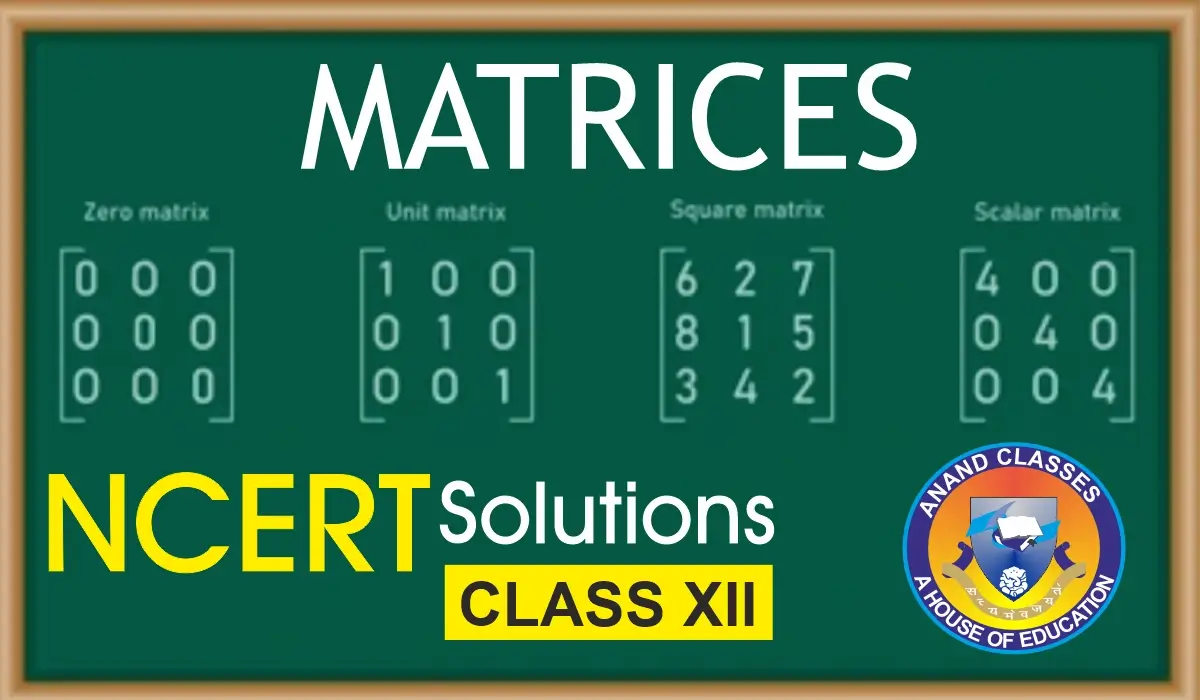Anand Classes presents a comprehensive, free downloadable PDF of NCERT Solutions for Class 12 Maths Chapter 7 – Integrals, Exercise 7.3 (Set-2), expertly prepared with step-by-step explanations to cover all types of problems including integrals involving trigonometric identities, substitution, and partial fractions. These notes align with the latest CBSE syllabus and are ideal for revision and exam readiness. Click the print button to download study material and notes.
NCERT Question 8: Evaluate the Integral
$$\displaystyle \int \frac{1 – \cos(x)}{1 + \cos(x)}\; dx$$
Solution
$$\displaystyle \int \frac{1 – \cos(x)}{1 + \cos(x)}\; dx$$
First, simplify the integrand using trigonometric identities.
We know:
$$1 – \cos(x) = 2\sin^2\left(\frac{x}{2}\right)$$
$$1 + \cos(x) = 2\cos^2\left(\frac{x}{2}\right)$$
Substitute these values:
$$\frac{1 – \cos(x)}{1 + \cos(x)} = \frac{2\sin^2\left(\frac{x}{2}\right)}{2\cos^2\left(\frac{x}{2}\right)} = \tan^2\left(\frac{x}{2}\right)$$
Thus,
$$\int \frac{1 – \cos(x)}{1 + \cos(x)}\; dx = \int \tan^2\left(\frac{x}{2}\right)\; dx$$
We know the identity:
$$\tan^2\theta = \sec^2\theta – 1$$
So,
$$\int \tan^2\left(\frac{x}{2}\right)\; dx = \int \left[\sec^2\left(\frac{x}{2}\right) – 1\right]\; dx$$
Now integrate term by term:
Let $u = \dfrac{x}{2}$, hence $du = \dfrac{1}{2}\; dx$ or $dx = 2\; du$.
Substitute:
$$\int \left[\sec^2(u) – 1\right]2\; du = 2\int \sec^2(u)\; du – 2\int 1\; du$$
Integrate:
$$= 2\tan(u) – 2u + C$$
Substitute back $u = \dfrac{x}{2}$:
$$= 2\tan\left(\frac{x}{2}\right) – x + C$$
Final Answer
$$\boxed{\displaystyle \int \frac{1 – \cos(x)}{1 + \cos(x)}\; dx = 2\tan\left(\frac{x}{2}\right) – x + C}$$
Enhance your trigonometric integration skills with Anand Classes — precise, step-by-step notes ideal for JEE, NEET, and CBSE aspirants.
NCERT Question 9: Evaluate the Integral
$$\displaystyle \int \frac{\cos(x)}{1+\cos(x)}\; dx$$
Solution
$$\displaystyle \int \frac{\cos(x)}{1+\cos(x)}\; dx$$
Rewrite the integrand by splitting the fraction:
$$\frac{\cos(x)}{1+\cos(x)}=\frac{1+\cos(x)-1}{1+\cos(x)}=1-\frac{1}{1+\cos(x)}$$
So
$$\int \frac{\cos(x)}{1+\cos(x)}\; dx=\int 1\; dx-\int \frac{1}{1+\cos(x)}\; dx = x-\int \frac{1}{1+\cos(x)}\; dx + C$$
Use the half-angle identity $1+\cos(x)=2\cos^2\bigl(\dfrac{x}{2}\bigr)$, hence
$$\frac{1}{1+\cos(x)}=\frac{1}{2\cos^2\bigl(\dfrac{x}{2}\bigr)}=\dfrac{1}{2}\sec^2\bigl(\dfrac{x}{2}\bigr)$$
Thus
$$\int \frac{1}{1+\cos(x)}\; dx=\dfrac{1}{2}\int \sec^2\bigl(\dfrac{x}{2}\bigr)\; dx$$
Let $u=\dfrac{x}{2}\Rightarrow du=\dfrac{1}{2}\;dx\Rightarrow dx=2\;du$. Then
$$\dfrac{1}{2}\int \sec^2\bigl(\dfrac{x}{2}\bigr)\; dx
=\dfrac{1}{2}\cdot 2\int \sec^2(u)\; du
=\int \sec^2(u)\; du
=\tan(u)$$
Substitute back $u=\dfrac{x}{2}$ to get $\tan\bigl(\dfrac{x}{2}\bigr)$.
Therefore the integral is
$$\boxed{\displaystyle \int \frac{\cos(x)}{1+\cos(x)}\; dx = x-\tan\bigl(\dfrac{x}{2}\bigr)+C}$$
Download concise and exam-oriented notes by Anand Classes — perfect for quick revision and practice for JEE, NEET, and CBSE examinations.
NCERT Question 10: Evaluate the Integral
$$\displaystyle \int \sin^4(x)\; dx$$
Solution
$$\displaystyle \int \sin^4(x)\; dx$$
Use the power-reduction identity:
$$\sin^2(x) = \frac{1 – \cos(2x)}{2}$$
Hence,
$$\sin^4(x) = \left(\frac{1 – \cos(2x)}{2}\right)^2 = \frac{1}{4}(1 – 2\cos(2x) + \cos^2(2x))$$
Now substitute $\cos^2(2x) = \dfrac{1 + \cos(4x)}{2}$:
$$\sin^4(x) = \frac{1}{4}\left[1 – 2\cos(2x) + \frac{1 + \cos(4x)}{2}\right]$$
Simplify:
$$\sin^4(x) = \frac{1}{4}\left(\frac{3}{2} – 2\cos(2x) + \frac{1}{2}\cos(4x)\right)$$
$$\sin^4(x) = \frac{3}{8} – \frac{1}{2}\cos(2x) + \frac{1}{8}\cos(4x)$$
Now integrate each term:
$$\int \sin^4(x)\; dx = \int \left(\frac{3}{8} – \frac{1}{2}\cos(2x) + \frac{1}{8}\cos(4x)\right)\; dx$$
Integrate term by term:
$$= \frac{3x}{8} – \frac{1}{2} \times \frac{\sin(2x)}{2} + \frac{1}{8} \times \frac{\sin(4x)}{4} + C$$
Simplify:
$$\boxed{\displaystyle \int \sin^4(x)\; dx = \frac{3x}{8} – \frac{1}{4}\sin(2x) + \frac{1}{32}\sin(4x) + C}$$
Master advanced trigonometric integration with Anand Classes — your trusted source for step-by-step solutions and conceptual clarity for JEE, NEET, and CBSE preparation.
NCERT Question 11: Evaluate the Integral
$$\displaystyle \int \cos^4(2x)\; dx$$
Solution
$$\displaystyle \int \cos^4(2x)\; dx$$
Use the power-reduction identity:
$$\cos^2(\theta) = \frac{1 + \cos(2\theta)}{2}$$
So,
$$\cos^4(2x) = \left(\frac{1 + \cos(4x)}{2}\right)^2 = \frac{1}{4}\left(1 + 2\cos(4x) + \cos^2(4x)\right)$$
Now, apply the identity again to $\cos^2(4x)$:
$$\cos^2(4x) = \frac{1 + \cos(8x)}{2}$$
Substitute it:
$$\cos^4(2x) = \frac{1}{4}\left[1 + 2\cos(4x) + \frac{1 + \cos(8x)}{2}\right]$$
Simplify:
$$\cos^4(2x) = \frac{1}{4}\left(\frac{3}{2} + 2\cos(4x) + \frac{1}{2}\cos(8x)\right)$$
$$\cos^4(2x) = \frac{3}{8} + \frac{1}{2}\cos(4x) + \frac{1}{8}\cos(8x)$$
Now integrate each term:
$$\int \cos^4(2x)\; dx = \int \left(\frac{3}{8} + \frac{1}{2}\cos(4x) + \frac{1}{8}\cos(8x)\right)\; dx$$
Integrate term by term:
$$= \frac{3x}{8} + \frac{1}{2} \times \frac{\sin(4x)}{4} + \frac{1}{8} \times \frac{\sin(8x)}{8} + C$$
Simplify:
$$\boxed{\displaystyle \int \cos^4(2x)\; dx = \frac{3x}{8} + \frac{1}{8}\sin(4x) + \frac{1}{64}\sin(8x) + C}$$
For detailed trigonometric integration notes and expertly solved examples, explore Anand Classes — the trusted choice for JEE, NEET, and CBSE aspirants.
NCERT Question 12: Evaluate the Integral
$$\displaystyle \int \frac{\sin^2(x)}{1+\cos(x)}\; dx$$
Solution
$$\displaystyle \int \frac{\sin^2(x)}{1+\cos(x)}\; dx$$
Simplify the integrand using trigonometric identities.
We know:
$$\sin^2(x) = 1 – \cos^2(x)$$
So,
$$\frac{\sin^2(x)}{1+\cos(x)} = \frac{1 – \cos^2(x)}{1+\cos(x)}$$
Factorize the numerator:
$$1 – \cos^2(x) = (1 – \cos(x))(1 + \cos(x))$$
Hence,
$$\frac{\sin^2(x)}{1+\cos(x)} = 1 – \cos(x)$$
Now the integral becomes:
$$\int \frac{\sin^2(x)}{1+\cos(x)}\; dx = \int (1 – \cos(x))\; dx$$
Integrate term by term:
$$= \int 1\; dx – \int \cos(x)\; dx$$
$$= x – \sin(x) + C$$
Final Answer
$$\boxed{\displaystyle \int \frac{\sin^2(x)}{1+\cos(x)}\; dx = x – \sin(x) + C}$$
Build a stronger foundation in trigonometric identities and integration with Anand Classes — the perfect guide for CBSE, NEET, and JEE aspirants seeking conceptual clarity and accuracy.
NCERT Question 13: Evaluate the Integral
$$\displaystyle \int \frac{\cos(2x)-\cos(2\alpha)}{\cos(x)-\cos(\alpha)}\; dx$$
Solution
$$\displaystyle \int \frac{\cos(2x)-\cos(2\alpha)}{\cos(x)-\cos(\alpha)}\; dx$$
Use the double-angle identity $\cos(2t)=2\cos^2 t-1$. Then the numerator becomes
$$\cos(2x)-\cos(2\alpha)=2\cos^2 x-1- (2\cos^2\alpha-1)
=2\bigl(\cos^2 x-\cos^2\alpha\bigr).$$
Factor the difference of squares:
$$2\bigl(\cos^2 x-\cos^2\alpha\bigr)=2\bigl(\cos x-\cos\alpha\bigr)\bigl(\cos x+\cos\alpha\bigr).$$
Therefore the integrand simplifies to
$$\frac{\cos(2x)-\cos(2\alpha)}{\cos(x)-\cos(\alpha)}
=2\bigl(\cos x+\cos\alpha\bigr).$$
So the integral becomes
$$\int 2\bigl(\cos x+\cos\alpha\bigr)\; dx
=2\int \cos x\; dx + 2\cos\alpha\int 1\; dx.$$
Integrate termwise:
$$2\int \cos x\; dx = 2\sin x,\qquad 2\cos\alpha\int 1\; dx = 2\cos\alpha\; x.$$
Final Answer
$$\boxed{\displaystyle \int \frac{\cos(2x)-\cos(2\alpha)}{\cos(x)-\cos(\alpha)}\; dx
=2\sin x + 2x\cos\alpha + C}$$
Clear, exam-focused solutions and downloadable notes by Anand Classes — ideal for JEE and CBSE preparation.
NCERT Question 14: Evaluate the Integral
$$\displaystyle \int \frac{\cos(x)-\sin(x)}{1+\sin(2x)}\; dx$$
Solution
$$\displaystyle \int \frac{\cos(x)-\sin(x)}{1+\sin(2x)}\; dx$$
Note that
$$1+\sin(2x)=1+2\sin(x)\cos(x)=(\sin(x)+\cos(x))^2.$$
Let
$$u=\sin(x)+\cos(x)\quad\Rightarrow\quad du=(\cos(x)-\sin(x))\; dx.$$
Hence the integral becomes
$$\int \frac{du}{u^2} = -\frac{1}{u}+C.$$
Substituting back,
$$\boxed{\displaystyle \int \frac{\cos(x)-\sin(x)}{1+\sin(2x)}\; dx = -\frac{1}{\sin(x)+\cos(x)} + C}$$
Download concise worked solutions and revision notes by Anand Classes, perfect for JEE and CBSE exam preparation.
NCERT Question 15: Evaluate the Integral
$$\displaystyle \int \tan^3(2x)\sec(2x)\; dx$$
Solution
$$\displaystyle \int \tan^3(2x)\sec(2x)\; dx$$
Let
$$I = \int \tan^3(2x)\sec(2x)\; dx$$
We know that $\tan^2(2x) = \sec^2(2x) – 1$.
Hence,
$$I = \int \tan(2x)\bigl(\sec^2(2x) – 1\bigr)\sec(2x)\; dx$$
Simplify:
$$I = \int \tan(2x)\sec^3(2x)\; dx \;- \int \tan(2x)\sec(2x)\; dx$$
Now let $u = \tan(2x)$, then
$$du = 2\sec^2(2x)\; dx \quad \Rightarrow \quad dx = \frac{du}{2\sec^2(2x)}.$$
Substitute into the integral term by term.
First Term:
$$\int \tan(2x)\sec^3(2x)\; dx = \frac{1}{2}\int u\sec(2x)\; du$$
But $\sec^2(2x) = 1 + u^2 \;\Rightarrow\; \sec(2x) = \sqrt{1 + u^2}$.
So,
$$\frac{1}{2}\int u\sqrt{1+u^2}\; du$$
Let $v = 1 + u^2$, then $dv = 2u\; du \Rightarrow u\; du = \dfrac{dv}{2}.$
Thus,
$$\frac{1}{2}\int u\sqrt{1+u^2}\; du = \frac{1}{4}\int v^{1/2}\; dv = \frac{1}{4} \times \frac{2}{3}v^{3/2} = \frac{1}{6}(1 + u^2)^{3/2}$$
Substitute $u = \tan(2x)$:
$$\frac{1}{6}(1 + u^2)^{3/2}=\frac{1}{6}(1 + \tan^2(2x))^{3/2}=\frac{1}{6}(\sec^2(2x))^{3/2}=\frac{1}{6}\sec^3(2x)$$
Hence,
$$\frac{1}{2}\int u\sqrt{1+u^2}\; du =\frac{1}{6}\sec^3(2x)$$
Second Term:
$$\int \tan(2x)\sec(2x)\; dx = \frac{1}{2}\sec(2x) + C$$
Now combine both results:
$$ I=\int \tan(2x)\sec^3(2x)\; dx \;- \int \tan(2x)\sec(2x)\; dx $$
$$ I = \frac{1}{6}\sec^3(2x) – \frac{1}{2}\sec(2x) + C$$
Final Answer
$$\boxed{\displaystyle \int \tan^3(2x)\sec(2x)\; dx = \frac{1}{6}\sec^3(2x) – \frac{1}{2}\sec^2(2x) + C}$$
Master trigonometric integrals step-by-step with Anand Classes — precise solutions and expertly explained methods for JEE, NEET, and CBSE exams.


